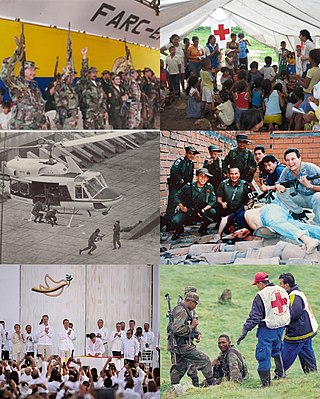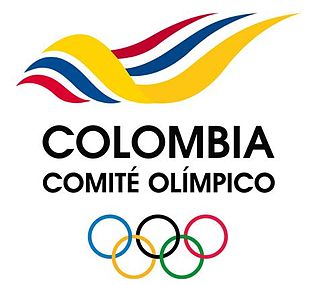| Synchronized Swimming at the 2006 Central American and Caribbean Games | |
|---|---|
| Location | Cartagena |
| Dates | 15-30 July |
The Synchronized swimming competition at the 2006 Central American and Caribbean Games was held in Cartagena, Colombia. The tournament was scheduled to be held from 15 to 30 July 2006.
* Host nation (Colombia)
| Rank | Nation | Gold | Silver | Bronze | Total |
|---|---|---|---|---|---|
| 1 | 2 | 2 | 0 | 4 | |
| 2 | 2 | 1 | 1 | 4 | |
| 3 | 0 | 1 | 3 | 4 | |
| Totals (3 entries) | 4 | 4 | 4 | 12 | |

Colombia, officially the Republic of Colombia, is a country primarily located in South America with insular regions in North America. The Colombian mainland is bordered by the Caribbean Sea to the north, Venezuela to the east and northeast, Brazil to the southeast, Ecuador and Peru to the south and southwest, the Pacific Ocean to the west, and Panama to the northwest. Colombia is divided into 32 departments. The Capital District of Bogotá is also the country's largest city hosting the main financial and cultural hub. Other major urbes include Medellín, Cali, Barranquilla, Cartagena, Santa Marta, Cúcuta, Ibagué, Villavicencio and Bucaramanga. It covers an area of 1,141,748 square kilometers and has a population of around 52 million. Its rich cultural heritage—including language, religion, cuisine, and art—reflects its history as a colony, fusing cultural elements brought by immigration from Europe and the Middle East, with those brought by the African diaspora, as well as with those of the various Indigenous civilizations that predate colonization. Spanish is the official language, although Creole, English and 64 other languages are recognized regionally.

The Revolutionary Armed Forces of Colombia – People's Army is a Marxist–Leninist guerrilla group involved in the continuing Colombian conflict starting in 1964. The FARC-EP was officially founded in 1966 from peasant self-defense groups formed from 1948 during the "Violencia" as a peasant force promoting a political line of agrarianism and anti-imperialism. They are known to employ a variety of military tactics, in addition to more unconventional methods, including terrorism.

Pablo Emilio Escobar Gaviria was a Colombian drug lord, narcoterrorist, and politician, who was the founder and sole leader of the Medellín Cartel. Dubbed "the king of cocaine", Escobar was one of the wealthiest criminals in history, having amassed an estimated net worth of US$30 billion by the time of his death—equivalent to $70 billion as of 2022—while his drug cartel monopolized the cocaine trade into the United States in the 1980s and early 1990s.

Álvaro Uribe Vélez is a Colombian politician who served as the 31st President of Colombia from 7 August 2002 to 7 August 2010.

The Colombian Liberal Party is a centre to centre-left political party in Colombia. It was founded as a classical liberal party but later developed a more social-democratic tradition, joining the Socialist International in 1999.

The Colombia national football team represents Colombia in men's international football and is managed by the Colombian Football Federation, the governing body for football in Colombia. They are a member of CONMEBOL and are currently ranked 14th in the FIFA World Rankings. The team are nicknamed Los Cafeteros due to the coffee production in their country. The national team has been a symbol of nationalism, pride and passion for many Colombians worldwide. Colombia is known for having a passionate fan base, and the team's dances during goal celebrations have been symbolic.

Miss Colombia is the national beauty pageant organization in Colombia.

Fabiola Zuluaga is a Colombian former professional tennis player. She reached the Australian Open semifinals in 2004, becoming the first Colombian to reach a major semifinal. Zuluaga is one of Colombia's most successful tennis players.

The Colombian conflict began on May 27, 1964, and is a low-intensity asymmetric war between the government of Colombia, far-right paramilitary groups and crime syndicates, and far-left guerrilla groups, fighting each other to increase their influence in Colombian territory. Some of the most important international contributors to the Colombian conflict include multinational corporations, the United States, Cuba, and the drug trafficking industry.
Team Colombia is a conservative political party in Colombia. At the last legislative elections, held on 10 March 2002, the party won, as one of the many small parties, parliamentary representation. It joined forces with ALAS, another small party, for the 2006 legislative election. In the election of 2006, the party won 7 out of 166 deputies and 5 out of 100 senators. The two political movements joined to form ALAS-Team Colombia.

Estadio Metropolitano Roberto Meléndez, commonly known as Estadio Metropolitano, or colloquially, El Metro, is a multi-use all-seater football stadium in Barranquilla, Colombia. It is the home stadium of local football team Atlético Junior. It was built with a capacity of 46,788 for the Colombian World Cup bid in 1986. The stadium was inaugurated that year with a game between Uruguay and Junior, which the Uruguayans won 2–1. It is the largest stadium in Colombia, after the Estadio Deportivo Cali's renovation. The first official name of the stadium was Estadio Metropolitano, which was changed around 1991 in order to honor the Colombian footballer Roberto Meléndez. This is the official stadium for the national football team of Colombia.

The IX South American Games was a multi-sport event held between 19 and 30 March 2010 in Medellín, Colombia. The Games were organized by the South American Sports Organization (ODESUR), who awarded the Games to the city with 8 votes over the bid by previous host Santiago, Chile.
Following are the official winners of the national Colombian Chess Championships from 1928 to date. The first Colombian Men's Championship was held in Cali in 1928, and first Women's Championship in Bogotá in 1965.

Abortion in Colombia is freely available on request up to the 24th week of pregnancy, due to a ruling by the Constitutional Court on February 21, 2022. Later in pregnancy, it is only allowed in cases of risk of death to the pregnant woman, fetal malformation, or rape, according to a Constitutional Court ruling in 2006.
This page shows the results of the cycling competition at the 2006 Central American and Caribbean Games, held on July 21 and July 22, 2006, in Cartagena, Colombia.

The 2006 South American Championships in Athletics were held at the Estadio La Independencia in Tunja, Colombia from 29 September to 1 October. The competition represented a departure from the traditional biennial cycle of the championships, a decision taken partly as a response to the lack of major competitions that year for the region's athletes, as well as the fact many athletes would instead focus on the 2007 World Championships in Athletics and the Pan American Games which were scheduled for the following year. The stadium's location at 2810 metres above sea level aided the performances of athletes competing in the sprint and field events. A total of 44 events were contested, of which 22 by male and 22 by female athletes.
The 2nd South American Under-23 Championships in Athletics were held in Buenos Aires, Argentina, at the Centro Nacional de Alto Rendimiento Deportivo (CeNARD) on November 10–12, 2006. The championships were held as a part of the 2006 South American Games (ODESUR). A detailed report on the results was given.
The Judo competition at the 2006 Central American and Caribbean Games was held in Cartagena, Colombia. The tournament was scheduled to be held from 25 to 29 July at the Coliseo de Gimnasia y Deportes de Combate, Unidad Deportiva Pedro de Heredia in Cartagena. This was the first time that the regional games held the Kata division.
Video gaming is a growing sector in Colombia. The medium has been popular in the country since the 1980s, but little local development had taken place until the turn of the 21st century. As the country has been producing many engineers since the early 2010s, many of which specialized in electronics, industry and information technology, the local video game industry has been booming.

The Colombia national under-23 football team represents Colombia at the Summer Olympic Games and in international under-23 football competitions and is overseen by the Colombian Football Federation.